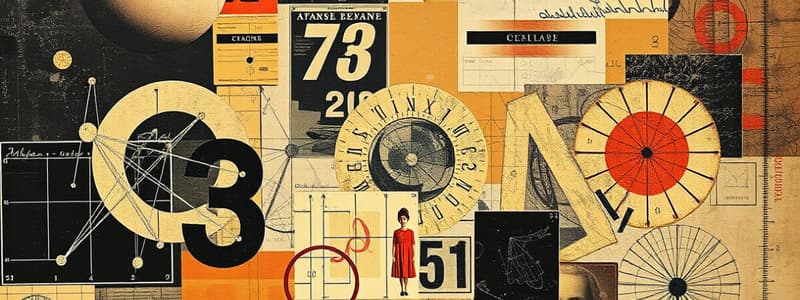Podcast
Questions and Answers
What is the value of $i^5$?
What is the value of $i^5$?
- $i$ (correct)
- $-i$
- $-1$
- $1$
How do you determine the value of $i^n$ for a given integer $n$?
How do you determine the value of $i^n$ for a given integer $n$?
- Use the formula $i^n = (-1)^{(n/2)}$
- Always consider $n$ as a negative number.
- Divide $n$ by $4$ and use the remainder. (correct)
- Add $4$ to $n$ before squaring $i$.
What defines two complex numbers as being equal?
What defines two complex numbers as being equal?
- Their real parts are equal, and their imaginary parts are equal. (correct)
- Their modulus are equal.
- Their imaginary parts are equal, and only one of their real parts is non-zero.
- Their absolute values are equal.
What distinguishes a complex number from its conjugate?
What distinguishes a complex number from its conjugate?
What is the result of $i^2$?
What is the result of $i^2$?
Flashcards are hidden until you start studying
Study Notes
Introduction to Complex Numbers
- The imaginary unit "i" is defined such that ( i^2 = -1 ) and is not part of the set of real numbers.
- Imaginary numbers cannot be represented on a traditional number line.
Powers of Imaginary Unit
- To compute ( i^n ):
- Divide ( n ) by 4 and determine the remainder.
- If remainder is 0, then ( i^n = 1 ).
- If remainder is 1, then ( i^n = i ).
- If remainder is 2, then ( i^n = -1 ).
- If remainder is 3, then ( i^n = -i ).
Solving Complex Equations
- The solution set for quadratic equations in complex numbers can be found using the quadratic formula: [ x = \frac{-b \pm \sqrt{b^2 - 4ac}}{2a} ]
Equality of Complex Numbers
- For two complex numbers to be equal, both their real parts and imaginary parts must be equal.
- Conjugates of complex numbers differ only in the sign of their imaginary components; for example, if ( z = a + bi ), then its conjugate is ( \overline{z} = a - bi ).
Studying That Suits You
Use AI to generate personalized quizzes and flashcards to suit your learning preferences.




